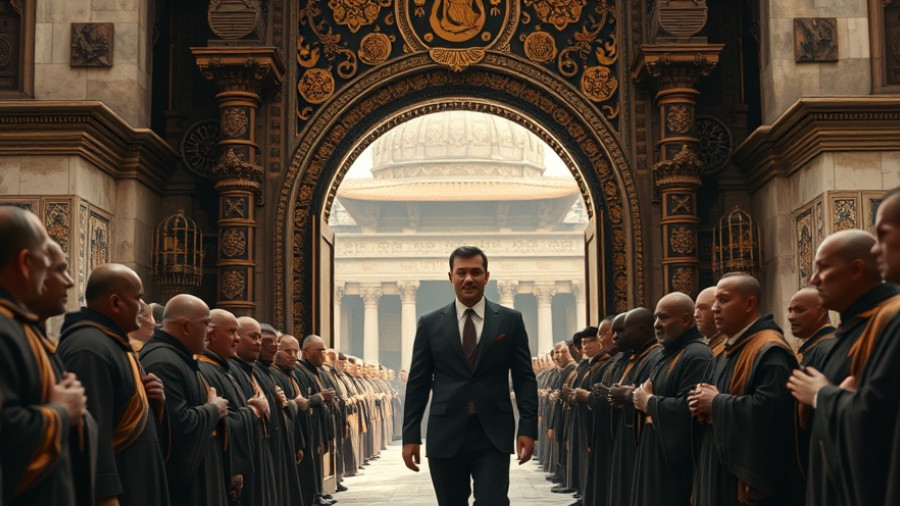
The Tension Over West Bank Annexation: A Diplomatic Blitz
In a recent diplomatic visit, U.S. Vice President JD Vance expressed serious concerns regarding Israel's parliament vote aimed at the annexation of the West Bank. Labeling it an 'insult,' Vance's remarks highlight the sensitive nature of U.S.-Israeli relations under the Trump administration, particularly amidst ongoing conflicts in the region. The vice president's comments reflect a broader U.S. policy that opposes any unilateral moves towards annexation, signaling a commitment to a fragile peace process.
The U.S.-Brokered Ceasefire: A Critical Moment
The backdrop of this political tension is the recently brokered ceasefire between Israel and Hamas, which has become increasingly vital. The U.S. has a vested interest in maintaining peace in Gaza, attempting to stabilize the region while ensuring that any steps taken by Israel do not undermine this effort. Vance emphasized that actions like the Knesset vote threaten the stability promised by this ceasefire.
Understanding the Vote: A Step Backward?
The controversial vote in Israel's Knesset resulted in a narrow approval—25 votes in favor and 24 against—to annex parts of the West Bank. While it remains unclear whether the bill has sufficient support to pass into law, the far-right political maneuvers indicate a significant shift in Israel's approach toward its territorial claims—a move counter to the long-standing U.S. position opposing such actions.
Regional Implications: The View from GCC Nations
The potential impact of this vote extends far beyond Israel and the West Bank. In the context of growing partnerships between Israel and Gulf Cooperation Council (GCC) countries, such actions could stifle budding alliances. The U.S. is actively working to secure support from these allies to ensure that any reconstruction efforts in Gaza do not face additional setbacks. Secretary of State Marco Rubio's planned visit emphasizes this strategy, as he seeks collaboration from these nations to form a potential stabilization force for Gaza.
A Lesson in Diplomacy
During his visit, Vance also addressed concerns that the Trump administration's policies could create the perception of Israel as a vassal state. By stating, 'We want a partnership, we want an ally,' Vance aims to reassure Israeli leaders and their constituents of the U.S.'s supportive role without undermining their sovereignty. This delicate balance of power reveals the complexities of international diplomacy where actions can have significant diplomatic ramifications.
What Lies Ahead: The Path to Peace?
As the dust settles from the Knesset vote, observers are left to ponder its implications for the future. Israel's Prime Minister Benjamin Netanyahu has significant control over the progress of this bill, with options to delay or even defeat it altogether. However, the sentiments expressed by U.S. leadership create a pressing backdrop for immediate deliberation in the Israeli parliament.
In a climate of heightened sensitivities, any misstep could reverse hard-won progress in the region. With over 200 U.S. troops stationed in a newly established civilian military coordination center, the ongoing process of stabilization is critical. The necessity of training a non-Hamas Palestinian police force emphasizes a step towards self-governance that aligns with U.S. interests in rebuilding Gaza.
As constituents in Bakersfield, CA, and beyond observe these developments, it is essential to stay informed on how international policies directly impact local communities and global relations. Understanding the intricate dance of diplomacy sheds light on everyday life, as decisions made thousands of miles away reverberate back home.
Understanding Our Role in Global Affairs
As citizens, we have a role in understanding these global dialogues and their implications for national security and humanitarian efforts. Engaging with these topics through local discussions or community forums can help foster a more informed electorate capable of making thoughtful decisions about foreign policy. Critical engagement may serve not only informational purposes but also inspire action.
What Can You Do?
As tensions continue and negotiations unfold, consider advocating for diplomacy-focused dialogues in your community. By promoting awareness and understanding of foreign conflicts and their local impacts, we can contribute to a more informed citizenry prepared to support policies that foster peace.
 Add Row
Add Row  Add
Add 



Write A Comment